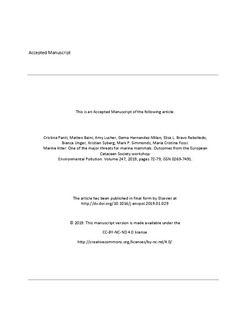| dc.description.abstract | Marine litter is a pollution problem affecting thousands of marine species in all the world's seas and oceans. Marine litter, in particular plastic, has negative impacts on marine wildlife primarily due to ingestion and entanglement. Since most marine mammal species negatively interact with marine litter, a first workshop under the framework of the European Cetacean Society Conference, was held in 2017 to bring together the main experts on the topic of marine mammals and marine litter from academic and research institutes, non-governmental organisations, foundations and International Agreements. The workshop was devoted to defining the impact of marine litter on marine mammals by reviewing current knowledge, methodological advances and new data available on this emerging issue. Some case studies were also presented from European waters, such as seals and cetaceans in the North, Baltic, and Mediterranean Seas. Here, we report the main findings of the workshop, including a discussion on the research needs, the main methodological gaps, an overview of new techniques for detecting the effects of marine litter (including microplastics) on marine mammals and, also, the use of citizen science to drive awareness. The final recommendations aim to establish priority research, to define harmonised methods to detect marine litter and microplastics, enforce networking among institutions and support data sharing. The information gathered will enhance awareness and communication between scientists, young people, citizens, other stakeholders and policy makers, and thereby facilitate better implementation of international directives (e.g., the Marine Strategy Framework Directive) in order to answer the question about the actual status of our oceans and finding solutions. | nb_NO |

